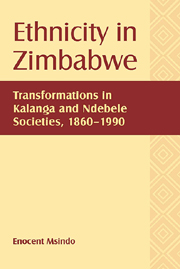Book contents
- Frontmatter
- Contents
- List of Illustrations
- Acknowledgments
- List of Abbreviations
- Note to the Reader
- Introduction
- 1 Ethnicity and Identities in Matabeleland
- 2 Domination and Resistance: Precolonial Ndebele and Kalanga Relations, 1860–93
- 3 Remaking Communities on the Margins: Chieftaincy and Ethnicity in Bulilima-Mangwe, 1893 to the 1950s
- 4 Ultraroyalism, King's Cattle, and Postconquest Politics among the Ndebele, 1893 to the 1940s
- 5 Language and Ethnicity in Matabeleland
- 6 Contests and Identities in Town: Bulawayo before 1960
- 7 Complementary or Competing? Ethnicity and Nationalism in Matabeleland, 1950–79
- 8 Postcolonial Terror: Politics, Violence, and Identity, 1980–90
- Conclusion
- Notes
- Selected Bibliography
- Index
- Rochester Studies in African History and the Diaspora
1 - Ethnicity and Identities in Matabeleland
Published online by Cambridge University Press: 05 February 2013
- Frontmatter
- Contents
- List of Illustrations
- Acknowledgments
- List of Abbreviations
- Note to the Reader
- Introduction
- 1 Ethnicity and Identities in Matabeleland
- 2 Domination and Resistance: Precolonial Ndebele and Kalanga Relations, 1860–93
- 3 Remaking Communities on the Margins: Chieftaincy and Ethnicity in Bulilima-Mangwe, 1893 to the 1950s
- 4 Ultraroyalism, King's Cattle, and Postconquest Politics among the Ndebele, 1893 to the 1940s
- 5 Language and Ethnicity in Matabeleland
- 6 Contests and Identities in Town: Bulawayo before 1960
- 7 Complementary or Competing? Ethnicity and Nationalism in Matabeleland, 1950–79
- 8 Postcolonial Terror: Politics, Violence, and Identity, 1980–90
- Conclusion
- Notes
- Selected Bibliography
- Index
- Rochester Studies in African History and the Diaspora
Summary
Ndebele and Kalanga Ethnicity: Theory and Context
Matabeleland is a restless frontier where identities (ethnic, regional, and national) have shifted and taken on different meanings with time. The history of this part of Zimbabwe is not simply a history of the Ndebele people but also a history of many other ethnic groups whose cultures, traditions, and societies have yet to be sufficiently explored and whose pasts thus remain hidden. Most of the scholars that have written about Matabeleland have simply worked under the false illusion that Matabeleland was synonymous with Ndebele-land. Thus, we have only disjointed and tiny bits of Kalanga past, Tonga folklore, and a bit of Venda history. However, there is a growing scholarship on Ndebele history, such as Ngwabi Bhebe's work on Ndebele and their encounter with Christianity; Cobbing's and Rasmussen's works on Ndebele sociopolitical history; and works on Ndebele religion, ethnicity, nationalism, evictions, and postcolonial history. Recently, Sabelo Ndlovu studied precolonial Ndebele history from a human rights dimension. Using mainly Ndebele aristocrats as his sources and operating within the ambit of the Gramscian theory of hegemony, Ndlovu tried to find “notions of human rights and democracy” in the alleged autocracy, barbarism, and militarism of precolonial Ndebele politics. Ndlovu's use of the oral testimony of Ndebele aristocrats, the zansi, as his major source of information for his work is problematic. His informants, mainly descendants of the precolonial ruling Ndebele elite class, tend to purvey the official version of the Ndebele past that often overlooks certain precolonial Ndebele injustices perpetrated against neighboring communities and lower classes of the Ndebele society.
- Type
- Chapter
- Information
- Ethnicity in ZimbabweTransformations in Kalanga and Ndebele Societies, 1860-1990, pp. 4 - 29Publisher: Boydell & BrewerPrint publication year: 2012

